Best Plagiarism Checkers (Free & Paid)
Plagiarism can ruin credibility like it never existed. This article will help you find the best plagiarism checkers that you can trust and use in your day-to-day tasks.
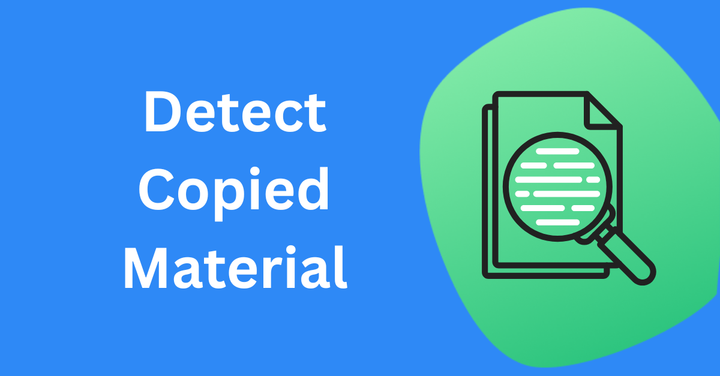
Plagiarism can be shrugged off as lazy writing, but it’s actually the fastest track to losing credibility and risking your entire reputation.
This is why plagiarism checkers have become absolutely essential for anyone producing written work. Yet not all plagiarism checkers deliver accurate results.
We tested seven of the most popular plagiarism checkers (both free and paid) to see how they perform in real scenarios.
Below, you’ll see our results, which include accuracy rates and scan limits so that you can see which is best for your needs.
So without further delay, let’s get to the list.
TL;DR
7 Best Plagiarism Checkers
To determine the effectiveness of each tool, we will test it with a text containing plagiarized snippets from two random sources, one a medium article and another a scientific paper.
These are the screenshots of both sources, for the record.
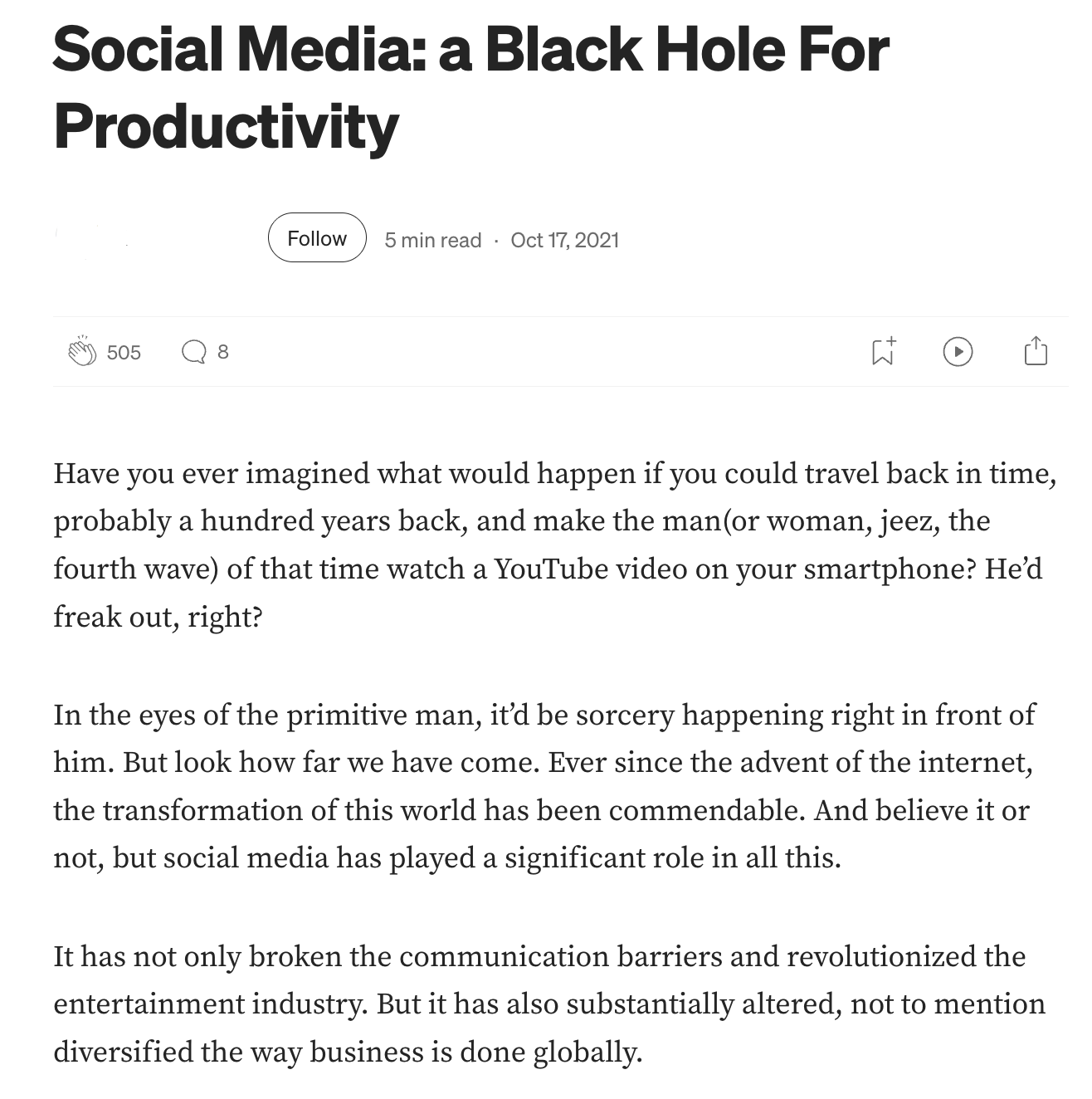

1. GPTZero
GPTZero is a leading AI detector in the market with a recognized accuracy rate of 99%.
But another thing it is extremely good at is plagiarism detection. Our plagiarism detector can confidently detect plagiarized text from over 100M sources, which includes formats like research papers, scholarly articles, websites, books, and more.
The free version of GPTZero lets you scan 10,000 words for plagiarism detection every month. That’s a generous number if you look around at the free scan limit of other tools.
Similarly, the amount of text you can scan in one go is 10,000 characters, which easily amounts to more than 1500 words.
Longer scans make detection more reliable, as the tool can catch plagiarism in context rather than in short fragments.
Some competitors give you a free scan limit in the range of 250-800 words, which barely scratches the surface, let alone produce accurate detection results.
While 10,000 words per month and 10,000 characters per scan will be enough for a wide range of users, they still won’t be enough for power users.
So if you're someone with higher needs, our paid plans are just as generous with the words/month limit without costing much. They also give a higher character limit per scan.
Here’s an overview of the three paid plans of GPTZero:
Now let’s test GPTZero’s plagiarism checker with our test sample made of snippets from a Medium article and a scientific study. Let’s go with the intros of both these sources.
Here’s how to check for plagiarism in GPTZero.
In GPTZero’s dashboard, paste the text and select “Plagiarism” from the scan menu, then click Scan.
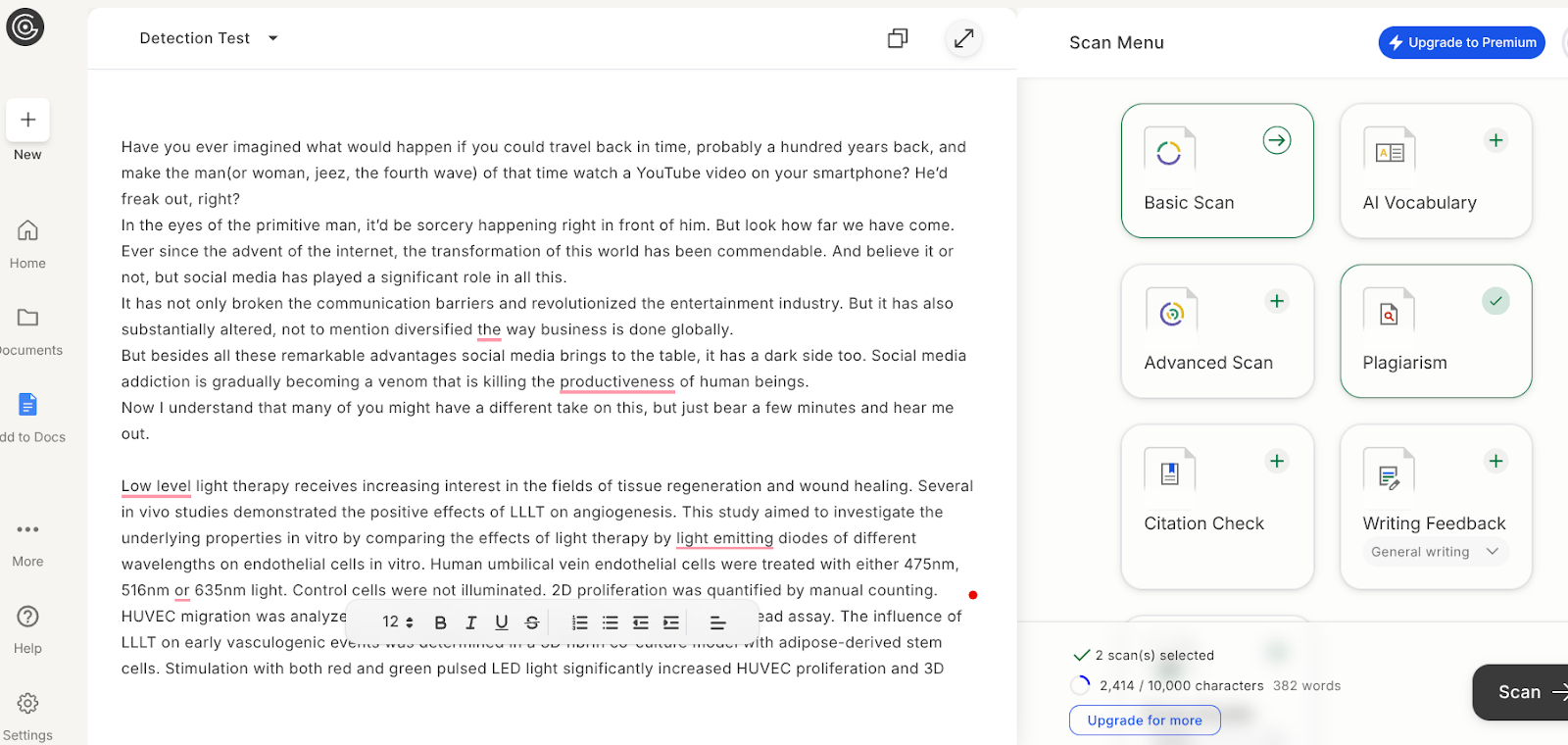
The scan will take its due time according to the length of your text. In the meantime, you can try to understand and appreciate the meaning behind the random profound quote displayed to you.
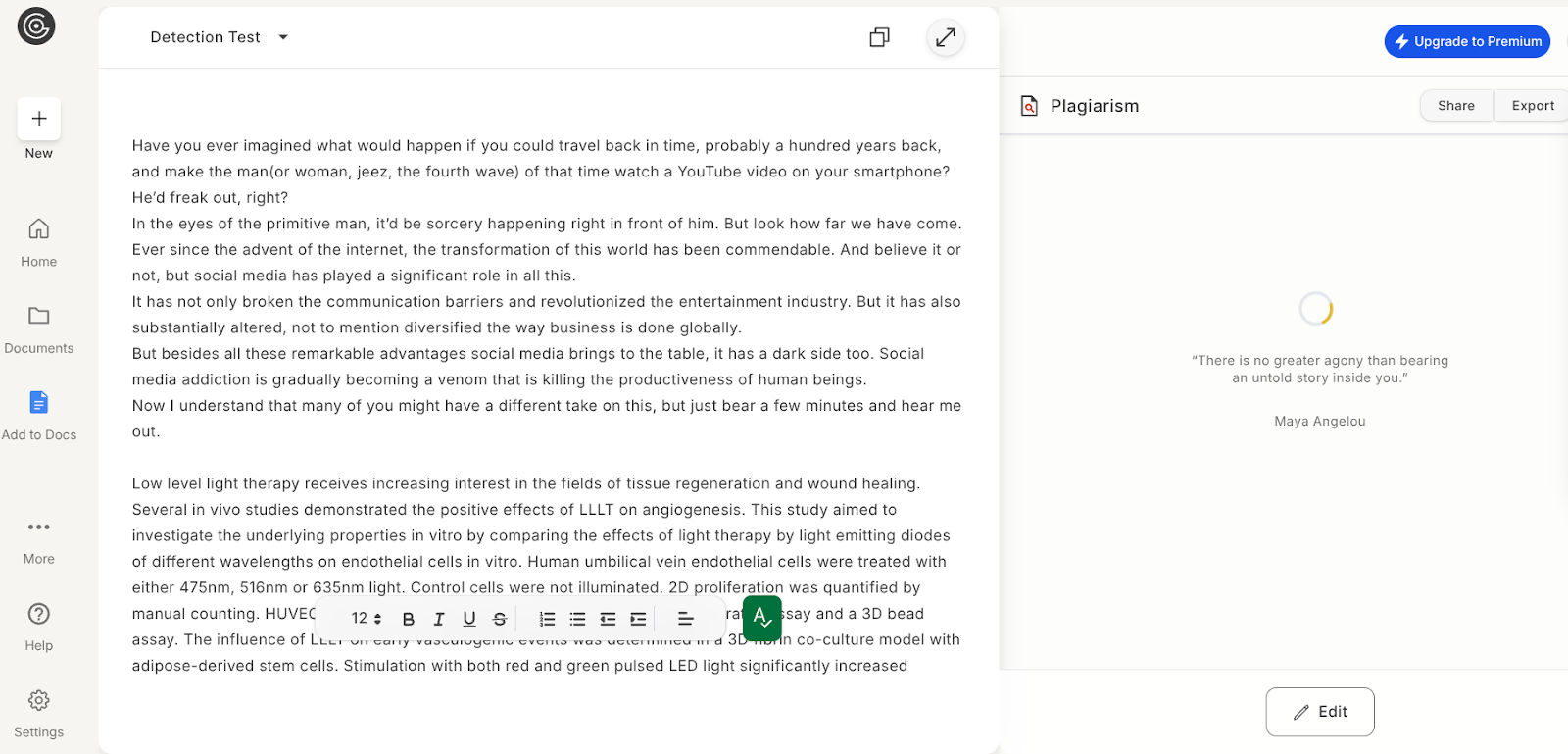
The results are as expected. To no surprise, GPTZero accurately detected the entire text as plagiarized.
Note that GPTZero scans text sentence by sentence. Our text sample had 20 sentences, and all 20 were correctly traced back to the medium article and the published research.
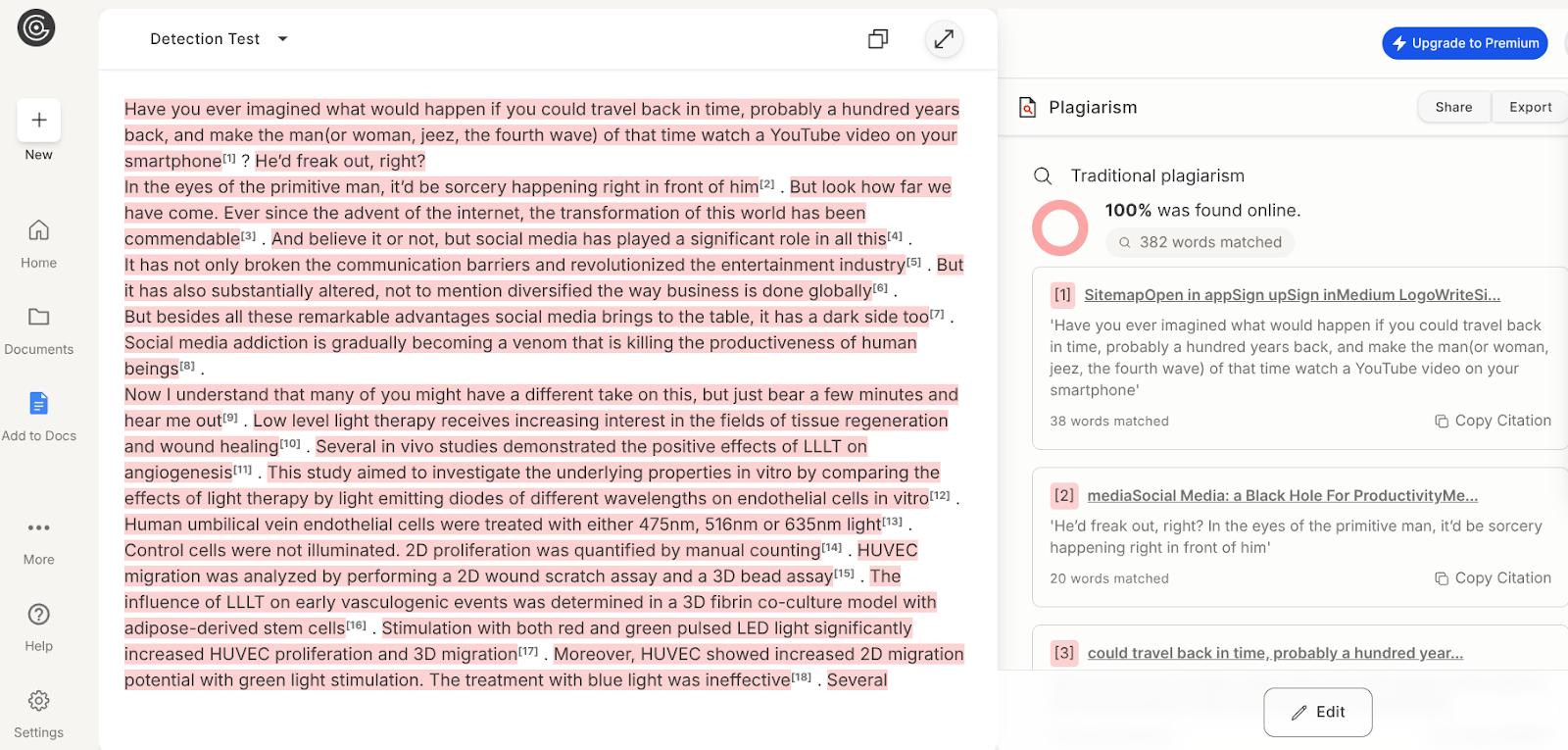
This was a short text.
To leave no shadow of doubt, we went extreme and tested an almost 10,000-character-long (1600+ words) sample.
This sample was one of our yet to publish articles, so there’s no chance of plagiarism.
But to make the test difficult, we introduced just a single plagiarized sentence to see if the tool would be able to dig it out from a 1600+ word strong text.
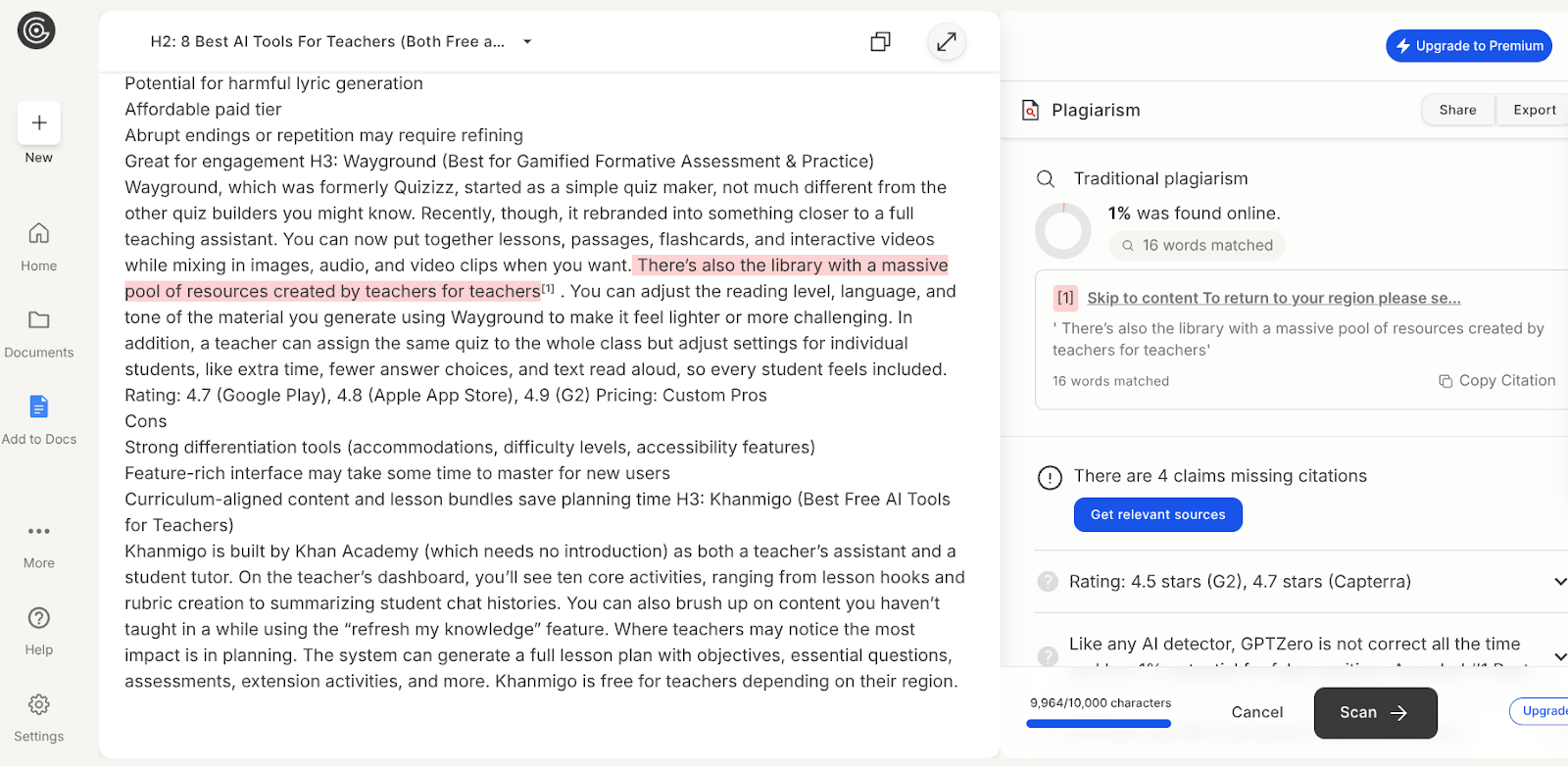
GPTZero’s plagiarism checker rocked again.
So, that was all why GPTZero has got the best plagiarism checker in the market. Here’s a pros and cons table for GPTZero.
2. Quetext
Quetext is one of the best plagiarism checkers, but fairly restrictive when it comes to free usage.
Before you create an account, you can run a scan of 500 words. From that point, the tool prompts you to sign up if you want to run another scan.
Signing up grants you one more 500-word trial. But after that, it’s time to pay.
There are two paid plans.
- The Essential plan starts at $14.99/month (when billed monthly) and lets you check up to 100,000 words a month.
- The Professional plan costs $29.98/month (when billed monthly) and doubles the limit to 200,000 words.
These limits are competitive and higher than most plagiarism checkers offer at this price point.
That said, Quetext is still a basic tool with no browser integration or plugins to offer.
Therefore, it can best function as a tool you use occasionally rather than one that’s woven into daily writing workflows.
Now for the testing, we used the same test sample.
Quetext took its time with the scan, noticeably slower compared to some other competitors in this list.
But the wait was worth it because Quetext did flag all of the plagiarized content correctly.
Every plagiarized line was underlined, and the tool used a color-coding system to show how strongly it matched the original source. Since all our lines were 100% plagiarized, the underlines were all red.
The source links to both sources were also provided directly.
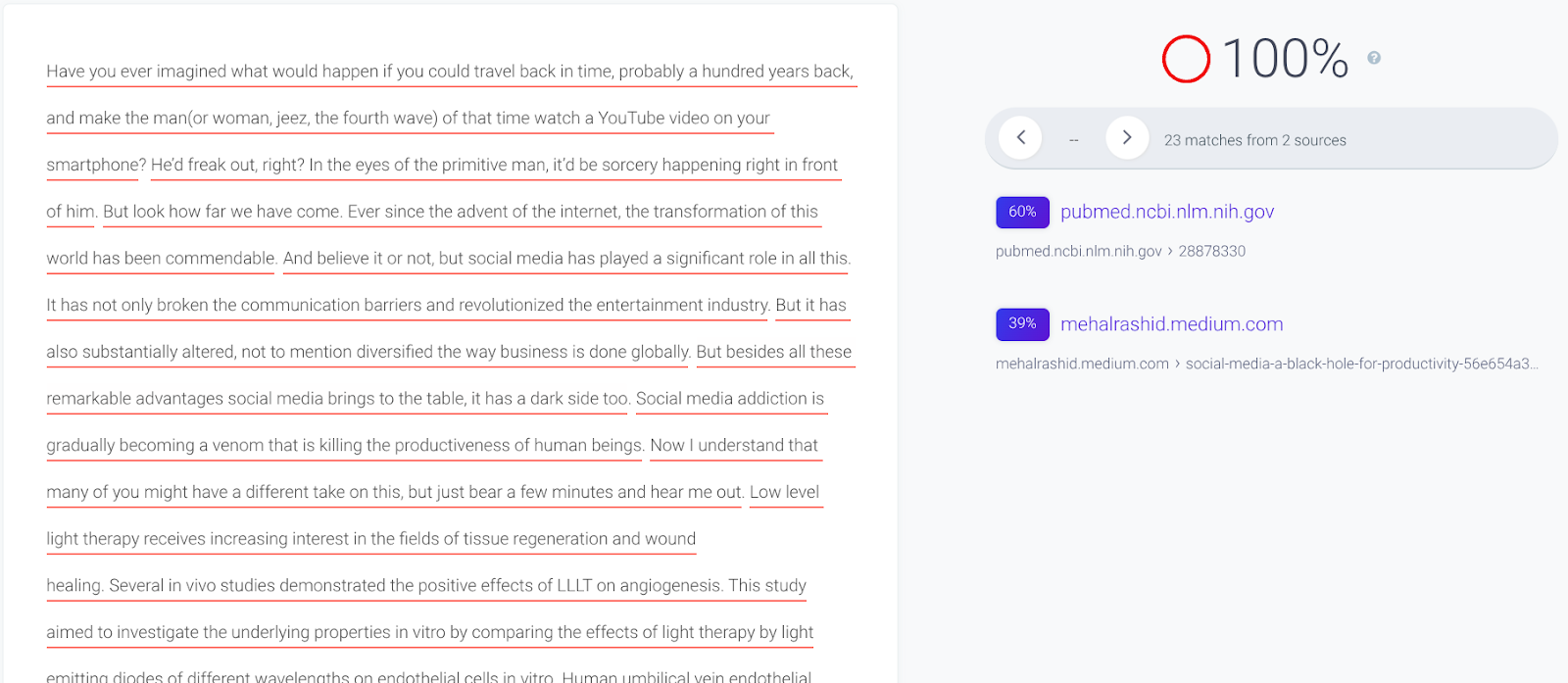
Here are the pros and cons of using Quetext.
3. PrePostSEO
PrePostSEO is less of a single tool and more of a toolbox of over 150 free online utilities for SEO, writing, website management, domain management, and plenty of other random-but-handy functions.
One of its most used (and advertised) products is the plagiarism checker.
Its free version allows users to scan up to 1,000 words at a time, and when you register a free account, the limit bumps slightly to 1,200 words.
The paid plans come in three tiers, but the cheapest one is the Basic package at $6.75/month (billed annually).
This plan supposedly allows up to 10,000 words per scan and 60,000 sentences per month (roughly 420,000 words).
However, the word limits listed on the plagiarism checker page don’t line up with those on the pricing page.
For example, “Basic Premium” users are said to get 5,000 words per scan on one page, while the pricing table claims it’s 10,000. The same contradictions show up in the Standard Premium tier, too.
In short, it’s not clear which limits one should base their purchasing decision on.
When it comes to testing, PrePostSEO ran the scan on our samples and, to its credit, flagged the content as 100% plagiarized. It also displayed both of the original sources from which the text was copied.
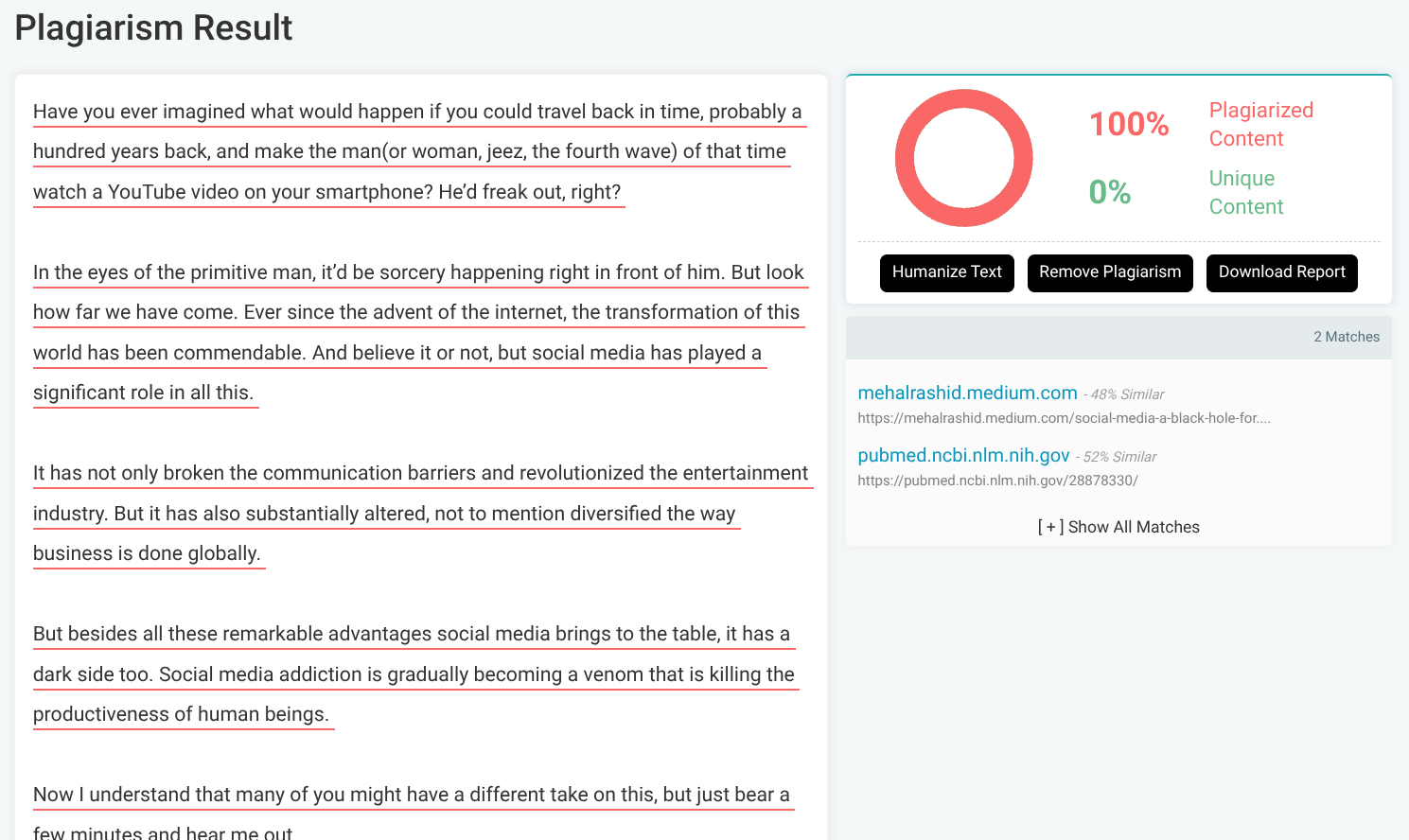
PrePostSEO uses color-coded underlining to distinguish between types of plagiarism.
Since our test samples were copied word-for-word, the whole thing had red underlines.
PrePostSEO’s premium plans include an Exclude Quotes option, which prevents the checker from counting properly quoted content toward plagiarism percentage, which can give more accurate results.
Not every plagiarism checker includes this, so it's a welcome feature.
4. Grammarly
Most people know Grammarly as a grammar assistant. But Grammarly also has one of the best plagiarism checkers.
Unfortunately, unlike GPTZero, Grammarly’s plagiarism checker isn’t included in its free plan.
The free version only teases you with a message saying there may be a need for citations without telling you anything about what, where, or how much.
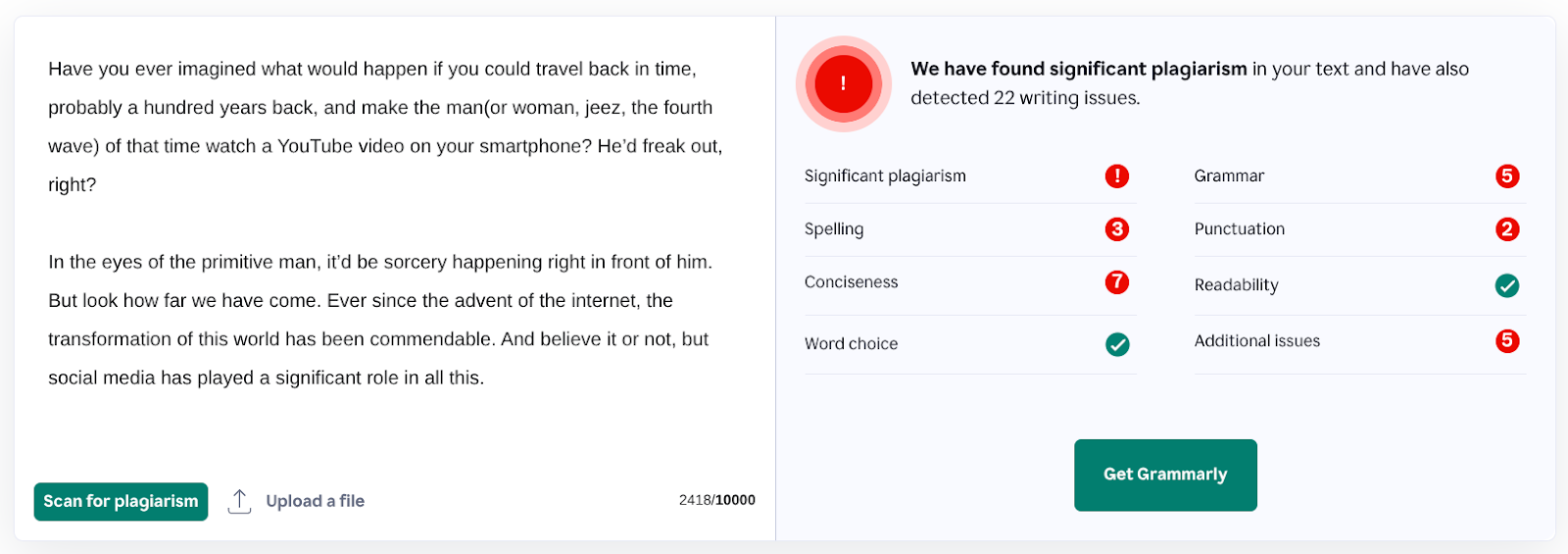
To actually see details, you need to upgrade to the Pro plan, which starts at $12/month on annual billing and $30/month on monthly billing.
The free version is only good for texts with little to no plagiarism, because then Grammarly tells you that it didn’t find any plagiarism.
Anyway, we used a paid version to detect plagiarism on our samples, and the results were as expected. Grammarly showed around 90% similarity from our research paper sample and 96% from the medium article.
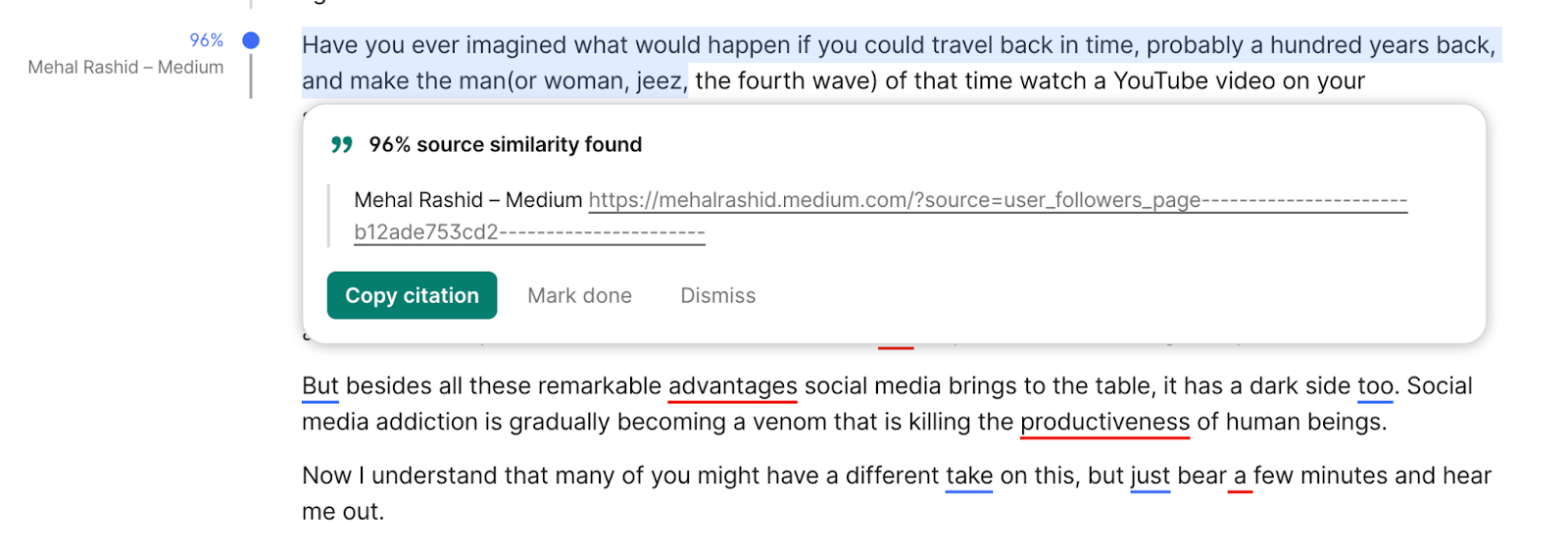
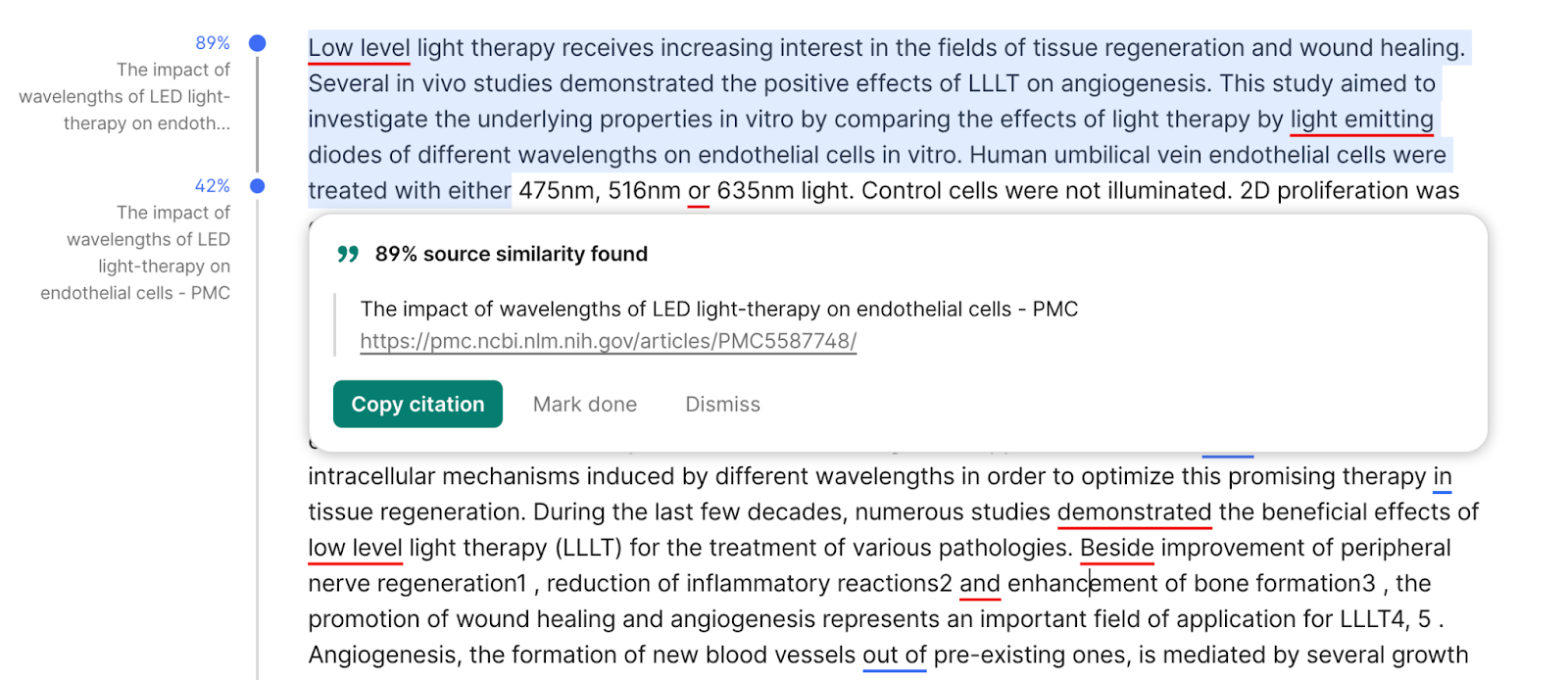
Grammarly redeems itself with the scan limit on its paid plan. Each scan allows 100,000 characters, and you can scan a total of 150,000 words a month.
The other paid plan is for enterprises with custom rates.
5. Copyleaks
Copyleaks is more of an enterprise and education-focused plagiarism checker than a tool for casual users.
One of the main reasons that makes us say that is because Copyleaks requires a subscription right from the start.
There’s no free trial, let alone a free version, of the plagiarism checker to test it before committing to a plan.
Schools and universities can purchase licenses based on the number of full-time students, and they get access to features like:
- Analytics at the student, course, and institution level
- Integrations with major LMS platforms (Canvas, Moodle, Blackboard, etc.)
- A Shared Data Hub, where institutions can contribute documents for better cross-checking accuracy
- Syncing grades and feedback directly back to the LMS
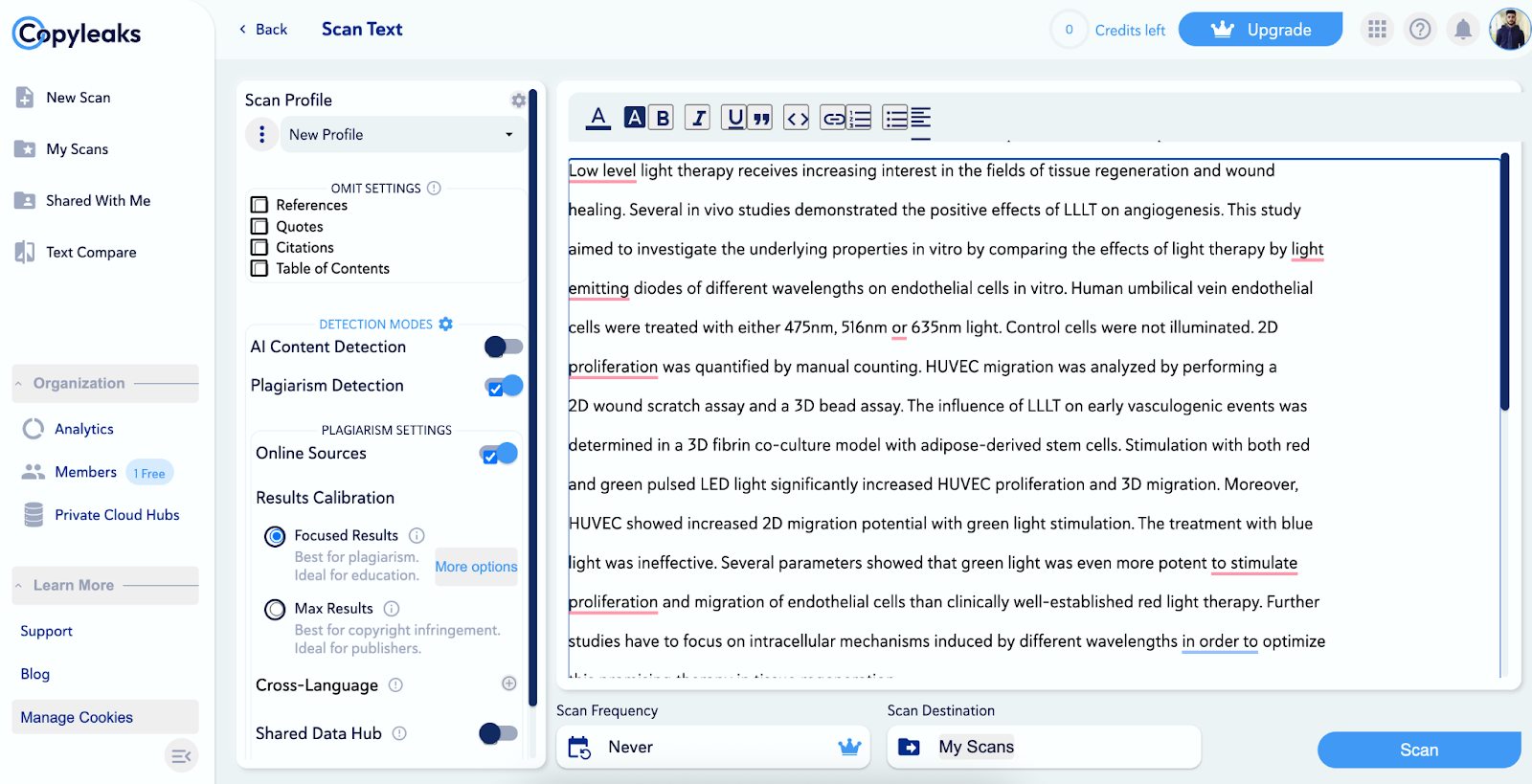
That said, casual users aren’t left out completely. There are two plans to choose from: Personal ($16.99/month) and Pro ($99.99/month).
But the plans are stingy with the scan limits.
Copyleaks has a credit system where 1 credit equals 250 words.
The Personal plan gives you 100 credits, which equals just 25,000 words monthly, which isn’t enough for a month by any means, even if your usage is moderate.
Compare this to GPTZero, which gives you 50,000 words for about the same price or half if you go for annual billing.
6. DupliChecker
Want a free plagiarism checker with no monthly usage caps? DupliChecker is that tool.
While its free version caps each scan at 1,000 words, it still doesn’t restrict how many words you can check overall.
If that limitation gets tiring, you can upgrade to a paid plan.
This brings us to DupliChecker’s very unique pricing structure.
The platform offers an overwhelming variety of plans. It has 40 monthly options (20 for casual users, 10 for institutes, 10 for enterprises) and up to 20 weekly options.
The cheapest monthly plan starts at $10 for 30,000 words, while the smallest weekly plan is $5 for 10,000 words.
The increments between plans are small in both price and word limit, which does offer flexibility, to be honest.
Individuals and businesses coming from all walks of life will find a plan affordable for them.
Despite everything, you cannot call DupliChecker the best free plagiarism checker due to how it performed in testing.
We put DupliChecker to the test with the same 100% plagiarized samples used for other tools in this list.
But DupliChecker detected only 23% plagiarism, which was only partial matches from the scientific study. The rest 77% was marked as unique.
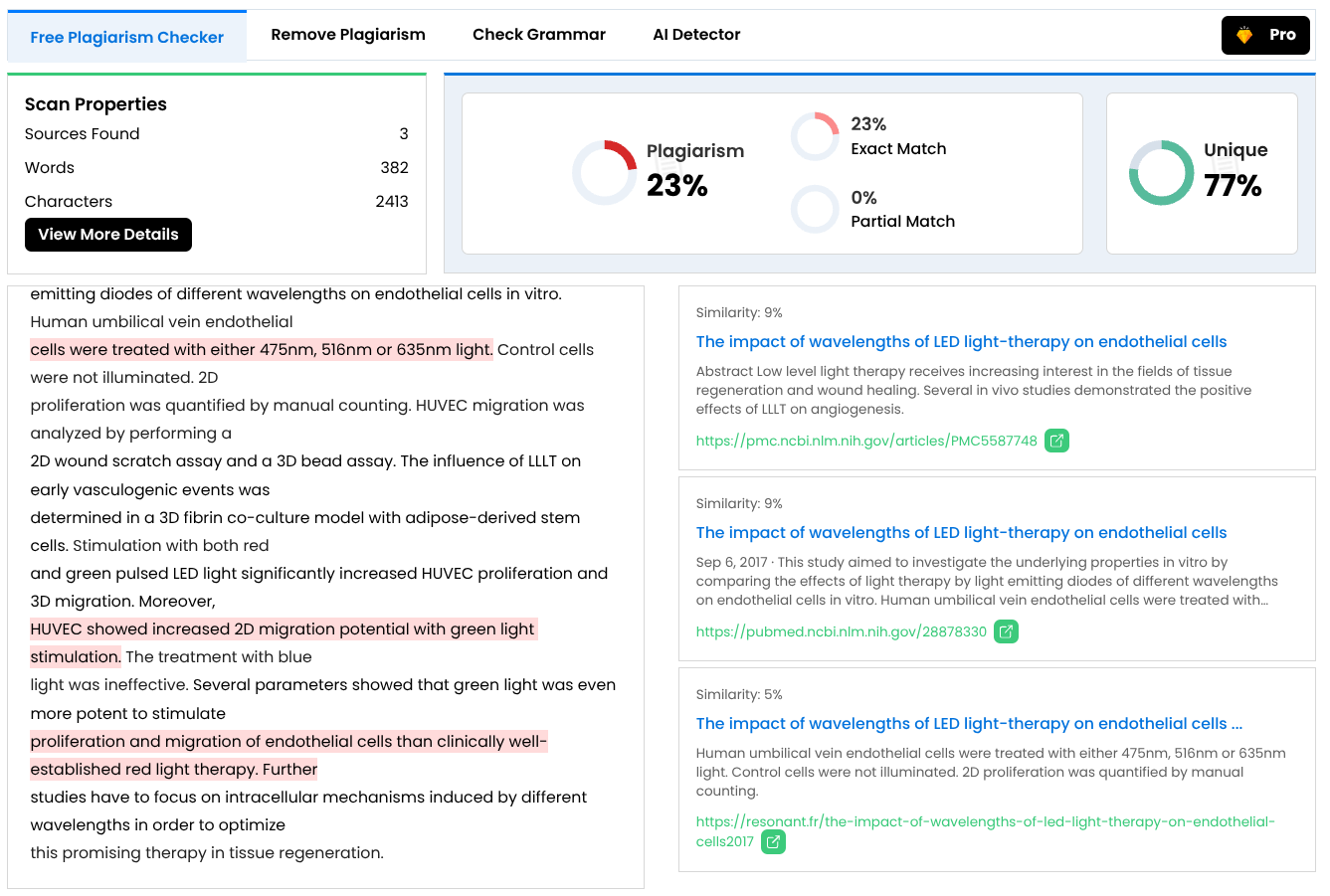
Even in the scientific study, it only picked up partial matches rather than complete sentences. And even when it rightly picked plagiarized sentences, it still often highlighted just fragments of those sentences.
It completely failed to detect any plagiarism from the Medium article.
7. Copyscape
Copyscape has been around since 2004 and thus is one of the older plagiarism checkers in the market.
While it’s a senior, it seems to have been stuck in the past.
The website and plagiarism checker page have a very basic design that hasn’t kept up with modern tools.
In the free version, you’re limited to just two scans. I had to figure this out by the brute force method because the website doesn’t mention it.
Also, the website doesn’t clearly state how many words you can check at once, but in our test, we were able to scan around 1,200 words using one of the two free attempts.
Once your two free scans are over, Copyscape greets you with the following message asking you to upgrade.
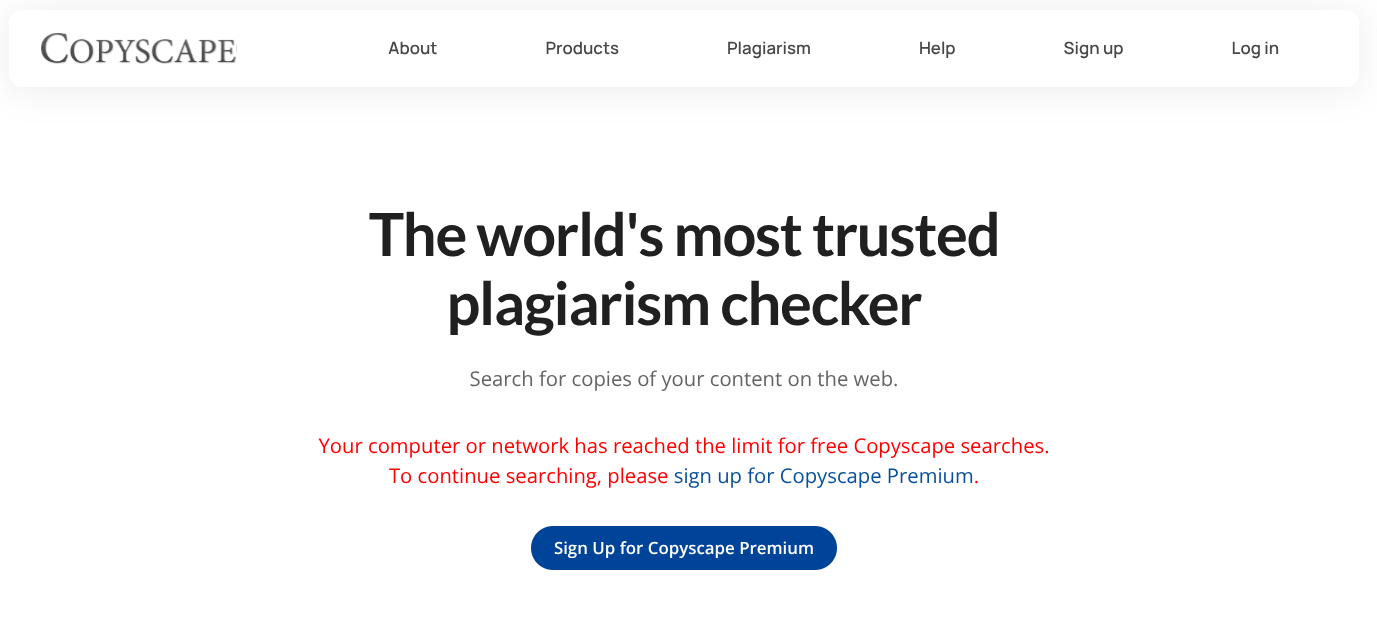
The platform runs on a pay-as-you-go model. Finding pricing was a hassle too, because the pricing page is just blocks of text with no real structure.
Here’s the pricing so you don’t have to witness what we did:
- $0.03 per scan (up to 200 words).
- $0.01 for every additional 100 words (or part thereof).
Now, the real part, testing!
Similar to DupliChecker, Copyscape picked up plagiarism from the scientific study only. The Medium article went completely undetected.
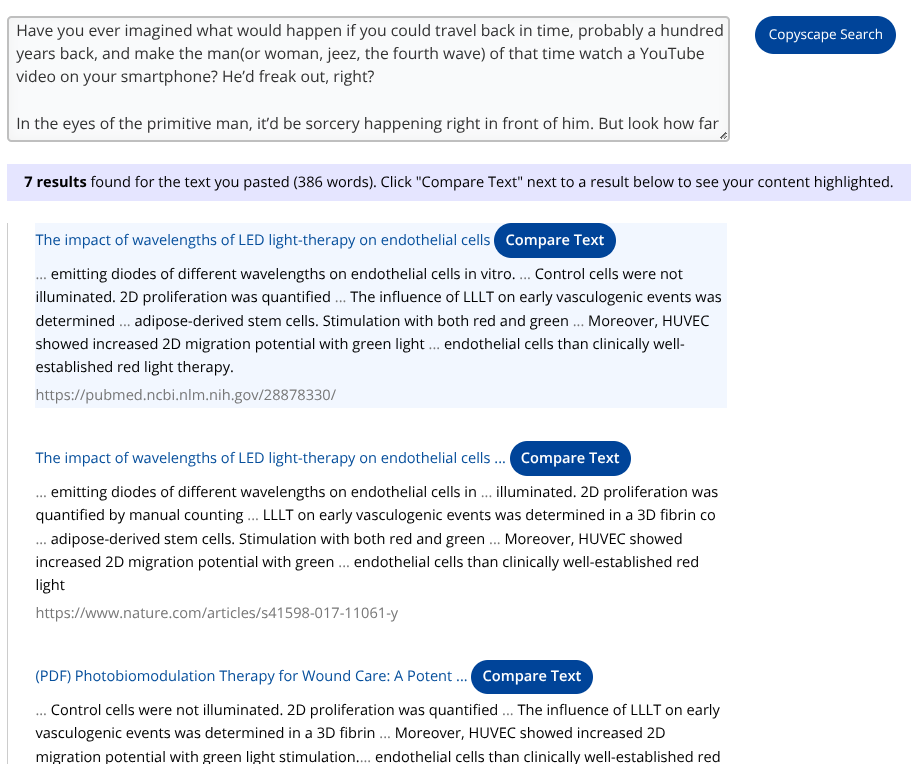
Copyscape didn’t show a plagiarism percentage either, which might be important for many. It simply told us how many results it found. In this case, it listed seven sources.
But even those matches weren’t highlighted. To view highlighted matches, you have to click into each result separately and go to the source’s page.
However, one good thing I noticed about Copyscape was that it dug up multiple versions of the scientific study from across the web.
This suggests that its database is heavier on published online studies than on other content types.
FAQs
How do plagiarism detectors work?
Plagiarism detectors scan your text and compare it against a huge database of sources like websites, academic papers, books, articles, and more. They break your content into smaller chunks (often sentence by sentence or phrase by phrase) and look for exact matches or close similarities.
If the tool finds an overlap, it keeps note of that to calculate a final plagiarism score of the entire text and then points you to the original source. Some detectors also use algorithms to spot paraphrased or slightly altered text.
What is the best plagiarism checker?
The best plagiarism detector accurately detects plagiarized text, whether it's the entire text or just a fraction of it. It should also have generous scan limits and preferably have a useful free version too. Its paid plans should also put no strain on your wallet. When you compare all plagiarism checkers in this article, only GPTZero meets all these requirements.
